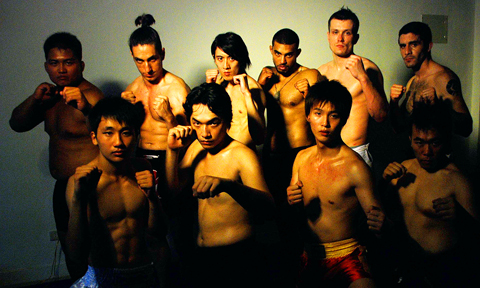Get ready for a beat down.
Martial artists from various backgrounds will bash the bejesus out of each other tonight for a prize purse at the Taipei Youth Activity Center (青少年育樂中心Y17) near Chiang Kai-shek Memorial Hall.
Organized by the Mingwu Mixed Martial Arts Club (名武會館綜合武術), the tournament consists of eight matches. Among the fighters are guests invited from Brazil who are trained in Brazilian jujitsu, a style of martial arts that specializes in full-body takedowns and grappling on the mat and was made famous by Joyce Gracie in the first series of Ultimate Fighting Championships back in the 1990s.

PHOTO COURTESY OF MINGWU MIXED MARTIAL ARTS CLUB
Between the bouts, Cristiane Santiago’s CapoArte school will stage demonstrations of capoeira, another Brazilian martial art characterized by drumming and dancing.
Teachers and organizers of the fight night say they want to educate Taiwan’s mixed martial arts scene about the importance of solid mat work, which is particularly useful in mixed martial arts fights.
“Not enough people know how to grapple in Taiwan. We want to show people how this technique can be effective,” says Lalin Youming (喇藺猶命), a Mingwu instructor.
The Mingwu club was organized by three martial arts teachers in Hsinchu. Song Mingyan (宋明諺) quit college to train full-time in wushu 10 years ago. Shortly after he began his training, he teamed up Chen Yihong (陳奕宏) to explore other styles such as karate, Shaolin kung fu and taekwondo. Joining later was Lalin, of the Taiya Aboriginal tribe, who brought his knowledge of tai chi to the club.
They now teach 90 students, one-fifth of whom are foreigners, Lalin says.
Tonight’s tournament runs from 7:30pm to 10:30pm on the 10th floor of the Taipei Youth Activity Center, at 17, Renai Rd Sec 2, Taipei City (北市仁愛路二段17號). For more information visit www.mingwu.com.tw.

Behind a car repair business on a nondescript Thai street are the cherished pets of a rising TikTok animal influencer: two lions and a 200-kilogram lion-tiger hybrid called “Big George.” Lion ownership is legal in Thailand, and Tharnuwarht Plengkemratch is an enthusiastic advocate, posting updates on his feline companions to nearly three million followers. “They’re playful and affectionate, just like dogs or cats,” he said from inside their cage complex at his home in the northern city of Chiang Mai. Thailand’s captive lion population has exploded in recent years, with nearly 500 registered in zoos, breeding farms, petting cafes and homes. Experts warn the

The unexpected collapse of the recall campaigns is being viewed through many lenses, most of them skewed and self-absorbed. The international media unsurprisingly focuses on what they perceive as the message that Taiwanese voters were sending in the failure of the mass recall, especially to China, the US and to friendly Western nations. This made some sense prior to early last month. One of the main arguments used by recall campaigners for recalling Chinese Nationalist Party (KMT) lawmakers was that they were too pro-China, and by extension not to be trusted with defending the nation. Also by extension, that argument could be

Aug. 4 to Aug. 10 When Coca-Cola finally pushed its way into Taiwan’s market in 1968, it allegedly vowed to wipe out its major domestic rival Hey Song within five years. But Hey Song, which began as a manual operation in a family cow shed in 1925, had proven its resilience, surviving numerous setbacks — including the loss of autonomy and nearly all its assets due to the Japanese colonial government’s wartime economic policy. By the 1960s, Hey Song had risen to the top of Taiwan’s beverage industry. This success was driven not only by president Chang Wen-chi’s

Last week, on the heels of the recall election that turned out so badly for Taiwan, came the news that US President Donald Trump had blocked the transit of President William Lai (賴清德) through the US on his way to Latin America. A few days later the international media reported that in June a scheduled visit by Minister of National Defense Wellington Koo (顧立雄) for high level meetings was canceled by the US after China’s President Xi Jinping (習近平) asked Trump to curb US engagement with Taiwan during a June phone call. The cancellation of Lai’s transit was a gaudy